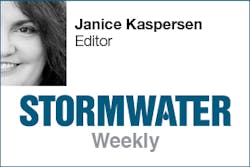
First, I want to say we’re thankful that Hurricane Patricia turned out to be less severe than expected, compared to the dire predictions last week as it headed for the Pacific coast of Mexico. As of midweek, Patricia was the strongest hurricane on record, with the lowest barometric pressure and winds up to 200 mph. The evacuation of thousands of people from coastal areas in Mexico, and the preparations in Texas and other states the storm was expected to reach, were absolutely necessary and undoubtedly saved lives. By late Saturday the storm had been downgraded to a tropical depression with sustained winds of only 35 mph, although it still brought heavy rains, flooding, and related damage.
- BMP Case Studies
- Green Infrastructure
- Stormwater Program Management
- Advanced Research Topics
- Water-Quality Monitoring
- Industrial Stormwater Management
- Stormwater Management for Solid Waste Facilities
The forecasting and tracking of hurricanes has become more accurate than ever. You can find up-to-the-minute information from the National Hurricane Center, along with explanations of the satellite and radar tools the NHC is using to make forecasts and track storms, and an archive of past events. When Patricia weakened, we had access to that information immediately.
Yet over the past several years, our expectations about storms—tropical storms, hurricanes, and even the so-called 100-year storm event far inland—seem to have altered. We’re aware that changing climate patterns and more extreme conditions have upended some of our models and have undermined confidence that the things we’d designed to deal with the weather—storm drainage systems or barriers to protect the coasts—are still adequate. It has become almost commonplace to expect that the next big storm might, in fact, be the biggest one ever.
How do you think these changing perceptions—and the resulting media coverage—have affected our preparation for hurricanes and other storm events? Are we making smarter decisions, such as being quicker to call for evacuations of vulnerable areas? Do you see any instances where we’re overreacting? Leave a comment below.
StormCon Call for Papers Is Open
StormCon, the only North American event dedicated exclusively to stormwater and surface-water professionals, is seeking abstracts for presentation at StormCon 2016. The deadline for submitting abstracts is Wednesday, December 9.
The conference will be held in Indianapolis, IN, August 22–25, 2016. We are looking for abstracts in the following conference tracks:
- BMP Case Studies
- Green Infrastructure
- Stormwater Program Management
- Advanced Research Topics
- Water-Quality Monitoring
- Industrial Stormwater Management
- Stormwater Management for Solid Waste Facilities
For more information, including the complete call for papers and an online form for submitting your abstract, visit www.StormCon.com.
About the Author
Janice Kaspersen
Janice Kaspersen is the former editor of Erosion Control and Stormwater magazines.

